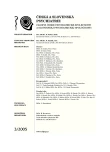-
Medical journals
- Career
Economic Aspects of Daily Psychiatric Care II. Comparison of Patients in Daily Care and Classical Hospitalization
Authors: E. Kitzlerová 1; A. Howardová 1; K. Půbal 2; doc. MUDr. Lucie Kališová, Ph.D. 1; M. Sekot 1; N. Baková 1; L. Číhal 3; J. Raboch 1
Authors‘ workplace: Psychiatrická klinika 1. LF UK a VFN, Praha ; přednosta prof. MUDr. J. Raboch, DrSc. 1; Vysoká škola ekonomická, Praha 2; Ministerstvo zemědělství ČR, Praha 3
Published in: Čes. a slov. Psychiat., 101, 2005, No. 3, pp. 148-154.
Category: Original Article
Overview
Studies involving economic part of treatment are in our country more of an exeption. Studies published in recent years show that treatment in a day hospital setting generally costs 1/3 less than comparable inpatient treatment. Day hospital treatment can prevent or reduce the number of somatic therapy measures. Patients treated in day care setting in the long run use less of follow up and outpatient care is cheaper than inpatient treatment for both patients and relatives. The noted affirmations are valid for about 20–40 % of persons with acute mental disorder.
The aim of the study was to identify and to compare the costs effectiveness in a day hospital setting and inpatient treatment.
Recruitment of the patients was carried out according to defined inclusion and exlusion criterias. Patients were randomised into group of day care setting and inpatient setting. Total number of patients was 206 (106 in inpatient care, 100 in day care setting), they were assessed in several periods: T1 – admission, T2 – 1 week after admission, T3 – 1 month after admission, T4 – during discharge, T5 – 3 months after discharge, T6 – 12 months after discharge. For the assessment of health care costs was used the CSRI questionnaire and the data were processed by our own designed procedure – “accountant way”. Psychopathology was assessed by BPRS questionnaire and treatment satisfaction was assessed by the CAT questionnaire.Results:
The average length of stay was 39 days in both settings. 72% of patients in the group of day care have finished the treatment, inpatient treatment (hospitalization) have finished 75.5% of them.
Psychiatric treatment in the form of day care is 22% (342 EUR/10 944 CZK) cheaper than inpatient care in some part of psychiatric patients with acute mental disorder (20–40%); this difference is statistically significant. Outpatient psychiatrists, psychologists, general practitioners and other physicians (neurologist, stomatologist, gynaecologist, surgeons etc.) were the most frequently used health services in both settings since the discharge. Psychopathology improved similary in both followed groups as well as the treatment satisfaction.Key words:
acute mental disorder, day care, hospitalization, economic aspects.
Labels
Addictology Paediatric psychiatry Psychiatry
Article was published inCzech and Slovak Psychiatry

2005 Issue 3-
All articles in this issue
- Drug Abuse and Treident of Health Complications among Dancing
- Economic Aspects of Daily Psychiatric Care I. Randomization Procedure, Sociodemographic and Clinical Characteristics
- Economic Aspects of Daily Psychiatric Care II. Comparison of Patients in Daily Care and Classical Hospitalization
- Structure and Function of the Nerve Cell Membrane
- Mental Features as an Initial Manifestation of Glioma
- The Drug Scene and Security Services
- Czech and Slovak Psychiatry
- Journal archive
- Current issue
- Online only
- About the journal
Most read in this issue- Mental Features as an Initial Manifestation of Glioma
- Drug Abuse and Treident of Health Complications among Dancing
- Structure and Function of the Nerve Cell Membrane
- Economic Aspects of Daily Psychiatric Care I. Randomization Procedure, Sociodemographic and Clinical Characteristics
Login#ADS_BOTTOM_SCRIPTS#Forgotten passwordEnter the email address that you registered with. We will send you instructions on how to set a new password.
- Career

